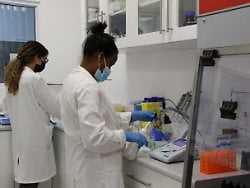Without the active help of the big players
WHO: Africa project produces vaccine candidates
2/6/2022, 6:54 p.m
The first corona vaccines were developed in rich countries. Since the companies do not share their patents, there is a project in Africa for patent-free corona vaccines. A first mRNA candidate was produced. However, established companies could help to finish developing it.
According to the World Health Organization (WHO), the project for a patent-free corona vaccine from Africa is progressing better than expected. The research and manufacturing center selected by the WHO in South Africa, the Manufacturing Hub, produced a vaccine candidate based on the novel mRNA technology within a few weeks, the WHO reported in Geneva.
This was possible without the support of the biotech companies that produce mRNA corona vaccines, but have so far refused to cooperate, said Martin Friede, WHO coordinator for vaccination research. In June 2021, the WHO selected the biotechnology company Afrigen Biologics and Vaccines in Cape Town as the hub. “In September, many said: This is rocket technology, you can’t do it,” said Friede. Tests of the vaccine candidate could start in the fall.
The WHO emphasizes that the laboratory uses publicly available technology and does not infringe any patents. The technology is to be made available to companies in other poorer countries. The laboratory also trains staff. In February, further countries are to be named in which production is to take place. Argentina and Brazil are already fixed as locations.
If companies are still helping, things would go faster
The WHO again called on biotech companies to participate in the project. This can save a lot of time in clinical studies. With their support, the development of a vaccine is conceivable in 12 to 18 months, otherwise it would take three years. Friede specifically named the US manufacturer Moderna and the Mainz-based company Biontech and its partner Pfizer. However, around 20 other companies – in China, Taiwan and India, for example – are now working on mRNA vaccines.
These biotechs, too, could benefit from specialist training at Afrigen if they enter into licensing agreements to produce their vaccines with laboratories in poorer countries, said Charles Gore, executive director of the Medicine Patent Pool. The UN-founded initiative negotiates and bundles patent licensing agreements with pharmaceutical companies to make them more accessible to generic drug makers.
The Afrigen project aims to revolutionize the supply of vaccines to poorer countries, said WHO chief scientist Soumya Swaminathan. The first corona vaccines were developed and manufactured in rich countries. “There was so much hope when the vaccines came – but then we saw the phenomenon of vaccine hoarding and rich countries secured billions of dollars of vaccine first refusal.” Poorer countries went almost empty-handed for months. The WHO has recognized that the problem can only be solved if production takes place there.
